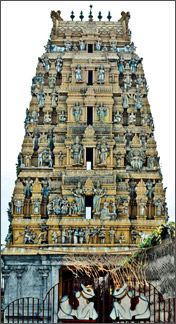Lead me to heaven from battlefield
Part II:
Prof. Anuradha SENEVIRATNA
Continued from 19th
Here, what he said was that the happiness of a Ksatriya is not the
domestic pleasure and comfort but in fighting for their right”.
Krisna further advises Arjuna and says that if he does not engage in
this lawful battle then he will fail in his duty and glory and will
incur sin. It is said.
Atha cet tvam
imam dharmayam
Samgramam na karisyasi
Tatah svadharmam kirtim ca
Hitva papam avapsyasi (2:33)
These sentiments expressed in the Bhagavadgita which describe the
duties of a ksatriya were in practice even in the pre-Christian era in
Sri Lanka.
|

A hindu temple |
This is evident when the great chronicle Mahavamsa speaks about King
Dutthagamini in the 2nd Century B.C. This is how the King lamented in
the presence of the Buddhist monks or mahasamgha thinking of the dead
warriors in the battlefield with whom he fought.
“Venerable sirs, how verily will there be comfort to me in that
caused the destination of a great army of myriads? “By this act of
yours, there is no hindrance in the way to heaven. Ruler of men only one
and a half men were killed here. One was established in the refuges and
the other only in the five precepts.
The heretical and evil others who died were like animals.” You will
make the Buddhist Faith shine in many ways. Therefore, Lord of men cast
away your mental confusion. Being so exhorted by them the great king
became comforted.”
This dialogue between the Buddhist monks and king Dutthagamini
illustrates that there is no difference between the dialogue between
Krisna and Arjuna and the above two. This also confirms that there was
no controversy between the Buddhists and Hindus on the question of the
duty of a Ksatriya. Both agree with each other.
The Bhavadgita on the other hand advises that we should not commit a
sin in retaliation for another sin - na pape pratipapah syat - and the
Mahabharata says that we should conquer the anger of other by non-anger
akrodena jine krodhas. These sayings quite agree with the teachings of
Buddha when it is said in the Dhammpada that Akkodhena Jine Kodham
Conquer anger by love.
The aim and duty of a ksatriya was well accepted by the Sinhala
society even in the pre-Christian era is evident by the above reference
found in the Mahavamsa in dealing with the last seconds of king
Dutthagamini’s life.
The duty of a Ksatriya is compared to a sage who is fighting to
conquer the deserves which is a hindrance to his final goal i.e. Nirvana
is further illustrated in the commentary written to Mahavamsa in the 9th
Century. It says:
Thero, “kim kathesi, maharaja? uyddhamhi jayaparajayo nama yodhanam
balathamasura bhlavaupayavibhagapati buddho. Tumhe attha
visatimahayuddhesu jananta sannad-dhaphalakayudha hutva
yuddhabalaparakkamena anosakkanta anivattabhumivan thatva amittamaddanam
katva vrjitasarigama ahuvattha. Imina maccurajena maranasangamabhimukhe
vijayasangame ekako hutva nibbuddhena jini tum na sakkoti;
kilesasangamamhi osaranto yogavacarakulaputto pi attano
phalakayudhasaimaddhabalathamasampannayodhanam upanissaya
upayavibhagapatiladdho hutva eva otarati otaretva sabba buddhanam
pavitthamhi amatamahi nibbananagaramhi gahitarajjo mahakhinasavo
ananthamhi samsare aparimanasu.
The thera said ‘what are you speaking on King? Victory and defeat in
a war depends on strength, power, deaverness, strategy examination etc.
of the giants. In a manner you subdue your enemies, you also should
subdue your desires in a war and finally attain emancipation or Nirvana
aimed by all Buddhas. The above passage further confirms that it is not
only defeating of the enemy in the battle field physically but also the
defeat of Kleshas or desires aimed by all Buddhas as their final goal.
The Sutta Nipata also has a similar idea in a verse when it says:
“Samgame me matam seyyo yance jive parajito”
To me death in battle is superior than life having lost. What is
meant by this is that death is much preferable than defeat in a
battlefield and the aim and determination of a soldier should be to
defeat the enemy in the battlefield.
To be continued |



